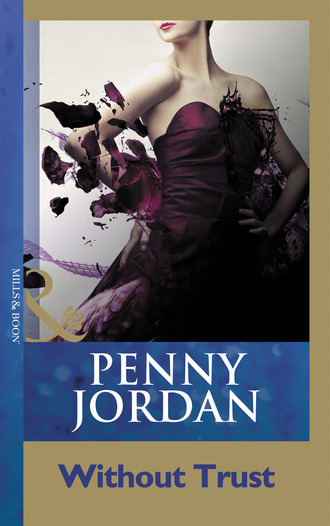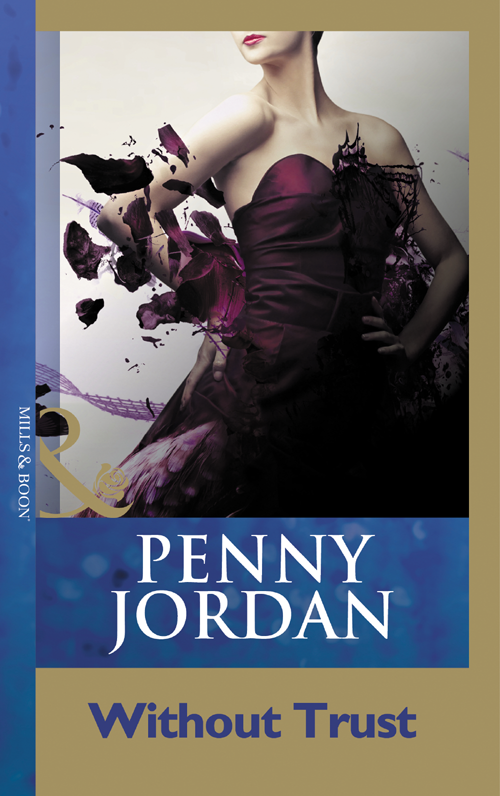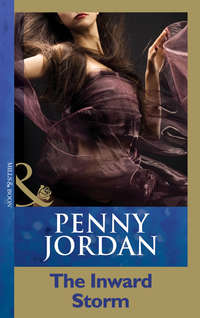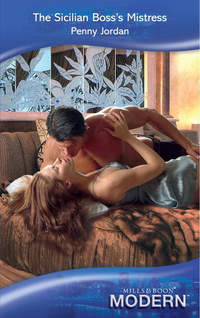
Полная версия
Without Trust


Celebrate the legend that is bestselling author
PENNY JORDAN
Phenomenally successful author of more than two hundred books with sales of over a hundred million copies!
Penny Jordan’s novels are loved by millions of readers all around the word in many different languages. Mills & Boon are proud to have published one hundred and eighty-seven novels and novellas written by Penny Jordan, who was a reader favourite right from her very first novel through to her last.
This beautiful digital collection offers a chance to recapture the pleasure of all of Penny Jordan’s fabulous, glamorous and romantic novels for Mills & Boon.
About the Author
PENNY JORDAN is one of Mills & Boon’s most popular authors. Sadly, Penny died from cancer on 31st December 2011, aged sixty-five. She leaves an outstanding legacy, having sold over a hundred million books around the world. She wrote a total of one hundred and eighty-seven novels for Mills & Boon, including the phenomenally successful A Perfect Family, To Love, Honour & Betray, The Perfect Sinner and Power Play, which hit the Sunday Times and New York Times bestseller lists. Loved for her distinctive voice, her success was in part because she continually broke boundaries and evolved her writing to keep up with readers’ changing tastes. Publishers Weekly said about Jordan ‘Women everywhere will find pieces of themselves in Jordan’s characters’ and this perhaps explains her enduring appeal.
Although Penny was born in Preston, Lancashire and spent her childhood there, she moved to Cheshire as a teenager and continued to live there for the rest of her life. Following the death of her husband, she moved to the small traditional Cheshire market town on which she based her much-loved Crighton books.
Penny was a member and supporter of the Romantic Novelists’ Association and the Romance Writers of America—two organisations dedicated to providing support for both published and yet-to-be-published authors. Her significant contribution to women’s fiction was recognised in 2011, when the Romantic Novelists’ Association presented Penny with a Lifetime Achievement Award.
Without Trust
Penny Jordan

MILLS & BOON
Before you start reading, why not sign up?
Thank you for downloading this Mills & Boon book. If you want to hear about exclusive discounts, special offers and competitions, sign up to our email newsletter today!
SIGN ME UP!
Or simply visit
signup.millsandboon.co.uk
Mills & Boon emails are completely free to receive and you can unsubscribe at any time via the link in any email we send you.
CHAPTER ONE
‘IT SHOULDN’T be long now.’ Did he realise how unreassuring he sounded? Lark wondered as she listened to the hesitant, slightly tense voice of her solicitor’s clerk. He probably wasn’t much older than she was herself, a young trainee whose work for a solicitor comprised, in the main, Legal Aid cases, which had probably never brought him into contact with a case of the notoriety and severity of this one. No wonder he was looking at her as though he half expected her to bare her teeth and then sink them into him. That was what predators did, wasn’t it?
Predators! She shuddered and wondered if she would ever fully be able to put behind her the events of the last ten months. She would never be able to forget them, that was for sure. The newspapers had had a field day with the story, giving it intense coverage, and why not? It was the sort of sordid tale that was almost guaranteed to sell newspapers.
Would this affect her chances? Her solicitor had not been able to reassure her that it would not, and perhaps, after all, that was what she deserved for being trusting and naïve. It amazed her that she still had the power to feel such indignation after the tremendous battering her self-confidence had received; and it had all started so innocently. But who was going to believe that now? The jury waiting outside to judge her? The ‘other side’ had engaged one of the country’s best-known prosecuting counsels. She herself had never met him, of course, but she had heard enough from her own solicitor to fear him. If he could see to it that the jury condemned her, he would. After all, that was his job.
That did not stop her feeling an almost irrational fear and hatred of him, though. Irrational because the person she really ought to hate was Gary, but somehow she couldn’t do that. Perhaps it was the memory of the childhood years they had shared that stopped her from doing so, or perhaps it was the blood bond between them. She had no idea. She only knew that all her fear, all her hatred, all her anxiety, was focused on the inquisition she knew was to come; an inquisition that would be conducted by James Wolfe himself. She couldn’t help shivering at the thought, her face pale and strained as she instinctively dipped her head forward in a defensive gesture so that it was shadowed by the curtain of her hair.
Only the previous week, her solicitor had begged her to give him the names of at least two character witnesses, who would strengthen their position, but how could she? Her aunt and uncle had refused to have anything to do with her. As far as they were concerned, she had ceased to exist, and in a way who could blame them? Her lips compressed and her companion, watching out of the corner of his eye, wondered if he dared tell her that her very obvious anger and resentment could only weigh against her.
Perhaps if she had looked different, pale and blonde maybe, instead of well tanned, her dark red hair curling riotously around her vivid face … Lark would have told him that her tan came from helping out on the allotments alongside the railway lines. The work was therapeutic and helped to pass the time. Perhaps she ought to have tried to get a proper job instead, but how could she? She had no references, nothing. Only the odd sound penetrated through the thick doors shutting her off from whatever was going on inside the court room.
Even though she had been expecting it, had been tensely waiting for it in fact, when the door eventually opened and her name was called, it made her jump.
The walk to the witness box was a long one. Lark was burningly conscious of other people’s curiosity. She refused to look anywhere other than at a spot somewhere above the judge’s head. Because of the amount of money involved, this was a High Court action. The sight of so many gowned and bewigged officials was intensely intimidating.
Even so, she lifted her chin a little higher—a tall, slender girl whose face held the promise of mature beauty, but which at the moment was marred by tension and pride.
‘Just look at her,’ she heard someone whisper behind her, ‘nose up in the air. You wouldn’t think she’d be that brazen, would you? Not after what she’s done.’
As she stepped into the witness box, Lark froze, her glance clashing with one of the bewigged lawyers. She had expected him to withdraw from the challenge under the hard stare of her dismissive eyes, something she had perfected over the long, hauntingly unhappy months, but instead she was the one to back down, to look away, a dark cloud of colour sweeping her skin as she did so.
He was tall, with dark hair showing under his wig, his skin almost as tanned as her own. His eyes were grey, a cool, unreadable grey that suggested that they knew a great many secrets. Who was he? Because she was so engrossed in him, she missed a few words the judge said, and therefore it was a shock to realise that he was coming towards her, although even then she didn’t realise the truth until he addressed her in a cool, well-modulated voice, his words telling her exactly who he was.
James Wolfe, the prosecuting counsel, whom her solicitor had told her had been hired at an enormous fee by Crichton International to make sure she was seen to be punished for her crime. Counsel for the prosecution—counsel—she knew exactly what that meant now, just exactly how far up the legal ladder that title indicated this man was. Yet he couldn’t be much over thirty—thirty-two or -three at the very most.
Her own counsel was much older, a dry, unsympathetic man, who had listened to her story as though he had found it boring and unbelievable. She remembered how frightened she had been then, realising for the first time just how alone she was, just how little anyone really cared. Certainly not enough to believe her, to understand.
The questions started, the story unfolding. Why were they bothering? Surely everyone in the country was familiar with them now? How her cousin had committed suicide on the eve of his employer’s discovery that he had embezzled many tens of thousands of pounds from them by way of a complicated computer fraud. He had known he was about to be found out, that much was obvious.
The police had broken into his flat just after he’d taken the overdose. There had been long enough before he died for him to tell them the story that brought her here to this court today.
The story—the lies, didn’t she mean? She had a shrewd idea why Gary had done it, of course, but who was going to believe her now? It had been three days before he’d died of liver failure connected with the effect of the tablets he had taken, a side-effect not known to many would-be suicides, and one which was just as lethal as the taking of the tablets themselves.
The police had remained at his bedside until he had lapsed into that final coma, or so she had been told. She had not been allowed to see him. Her aunt and uncle had been with him, of course. She had been waiting outside for them when they finally ended their long vigil.
She had never expected them to simply ignore her, never imagined they would believe Gary’s lies. He was their son. Surely they knew how he liked to embroider, to deceive? But of course that wasn’t the only reason he had told the police that he had stolen the money to give to her. He had said that it was her incessant demands, her threats of blackmail if he didn’t comply with them, that had driven him to more and more embezzlement and finally to suicide.
What had started as a game had got out of control because she had forced him to steal more and more, or at least that was what he had told them. Only it hadn’t been like that. She had had no idea what was going on; she had not even known about Lydia Meadows until she had seen the photographs in the local paper: a tall, elegant woman posing at the side of her much older husband, a very wealthy industrialist.
And then she remembered seeing Gary with her, a Gary who had obviously been completely besotted with her. Had she been the reason he had turned to crime? Had it been to protect Lydia that his dying words had been those lies which had brought Lark herself here today?
She admitted grimly to herself that she was probably never likely to know. After all, she wasn’t going to get much chance to find out, locked away behind prison walls.
James Wolfe was still watching her, and she only just managed to repress the violent shiver of anguish trembling through her body at the thought of what today could lead to—prison. She wanted to cry and scream that they were wrong, that she had done nothing, nothing at all. Pride wouldn’t let her.
Why would these strangers believe her when her own family would not?
She still couldn’t believe how completely her aunt and uncle had turned against her. How they had never even for one moment allowed themselves to believe that their son might be lying—that she might be the innocent party. All those years when she had tried to think of them as her parents, when she had hoped they thought of her as a daughter, she had been living a lie. She knew that now.
It was hard not to feel bitter, not to feel resentful. But bitterness and resentment would get her nowhere now. No—what she needed was the skill of another James Wolfe, skills that she somehow doubted she could find in her own tired and cynical counsel.
The cross-examination started and, although she was trembling inside, Lark held up her head proudly, her dark green eyes clashing with those of her attacker. How cool and controlled he was, how sure that he was going to win. She would be convicted. Such a large hammer to wield against such a very frail person as herself, but her cousin’s employers were determined to make an example of her now that Gary himself was beyond their reach.
They and others like them were too vulnerable to embezzlement of this kind, and therefore they would want to ensure that no one else was tempted to follow in Gary’s footsteps, that others saw exactly how harsh the punishment for such embezzlement could be. As an accomplice, her sentence would be comparatively light, of course—non-existent if she could convince the judge that Gary had lied. But, even as her solicitor had said those words, Lark had read in his eyes his own disbelief of her tale. After all, why should her cousin deliberately implicate her, a girl who had been brought up practically as his sister? What kind of man would do such a cruel and malicious thing to another member of his family? Certainly not a man as mild as Gary.
But there had been another side to Gary—one that the world did not see. One that was hidden and secret. It had been a long time since she had allowed herself to think of those first days when she had been orphaned, when Gary’s parents, her aunt and uncle, had taken her into their home.
They had been unhappy, dark days, filled with longing for the parents she had lost. Days which had been further darkened by Gary’s hostility towards her. Two years older than her, he had tormented her cruelly in those early months: getting her into trouble with his parents, stealing and destroying her toys, taunting her by telling her she would have to go and live in a home. But surely it wasn’t just because of his childish resentment that Gary had lied about her now?
No—she was convinced that there was more to it than that. Convinced that Gary had lied to protect the woman he loved. A woman who was married to another man.
Caught up in her own emotions, she was intensely aware of the emotional climate of the court room, and of the way James Wolfe skilfully played on those emotions, when describing to the jury the enormity of her supposed crime.
It was the company shareholders, ordinary people much like themselves, who would ultimately be the losers, so he told them. People who put their life savings into companies such as the one Gary worked for. Life savings which had been stolen by a young man who was now beyond their reach. But he was not the real perpetrator of the crime. He had been forced into it, blackmailed by his cousin, by herself.
Sickly, Lark realised that the jury were drinking in every word, sitting in silence, deeply absorbed in everything that James Wolfe was saying to them. He was lying, lying to them, she wanted to call out. None of what he said was true. She wasn’t the reason Gary had robbed his company. She wasn’t the one he had wanted the money for.
What was the use of saying anything? Nobody would believe her.
Listlessly, she answered the questions he put to her, the words mechanical and without emotion. How many times had she already been through those questions? How many times had she already listened to the same words?
The cold grey eyes focused on her, and an unnerving sensation raced up and down her spine.
‘What a very fortunate young woman you are, Miss Cummings. Tell me something, do you honestly feel no compunction, no guilt, no remorse?’
It was too much. Lark stared at him, her temper suddenly deserting her.
‘No,’ she told him recklessly, ‘I don’t feel any of those things. Not a single one. I don’t need to. I’m not guilty. I haven’t done anything. You don’t understand. You’re wrong, wrong!’
To her horror she discovered she was crying, her whole body shaking with the force of her emotions. There were sounds behind her, tuts from the jury, the vague sounds of unease the British always make in the face of other people’s emotions.
Hatred engulfed her as she tried to control herself. He had done it deliberately—deliberately trapped her into saying what she really felt. She looked at him proudly, her head held up, her body trembling under the force of her feelings. Grey eyes looked back at her. She could read nothing in them, but then, what had she expected to read? Triumph, because he knew he would win his case? He was far too professional for that, she decided scornfully, watching him as he turned and walked away from her.
The rest of the proceedings passed in a blur. There were questions and then more questions. There were speeches and then more speeches, but none of it meant anything to her. She already knew what the outcome was going to be. No one had had such a profound effect on the jury as James Wolfe, no one had had as profound an effect on her.
Her solicitor was withdrawn and ill at ease when the case was eventually adjourned for a break. The jury had retired to make their decision. As she stood in the long, draughty corridor next to her solicitor, Lark shivered convulsively. Only now, when it was over, did she actually realise what was happening to her: this could be one of her last few precious hours of true freedom. Prison. She shivered, unable to contemplate the enormity of what was going to happen to her.
Why? Why, when she was innocent? But this was a case in which innocence had to be proved, and how could she prove hers when she had been condemned by a dying man?
A harassed-looking court official appeared and drew her solicitor to one side. She saw them looking at her and her heart sank. Had the jury made their decision already? Was that what they were talking about?
Her solicitor turned to her and excused himself. The judge wanted to speak to him, he told her. He was gone for what seemed to be a long, long time. His assistant tried to take her mind off things by talking to her, but Lark wasn’t in the mood for chit-chat. In other circumstances, she might have been willing to make more of an effort. The young man was shy and meant well, but it was more than she could manage at the moment to respond to his inarticulate small-talk.
When her solicitor came back, he looked slightly flushed and rather surprised. He drew her to one side, his smile almost avuncular as he said jovially, ‘You’re a very lucky young lady, Miss Cummings. Crichtons have made a last-minute decision to withdraw their case. Apparently they’ve decided that the publicity your conviction would give them would not reflect well on them.’
‘To withdraw the case …’ Lark was practically stammering. ‘But surely they can’t just do that?’
‘Not in normal circumstances,’ her solicitor agreed. ‘But … er … in this case the judge has decided …’ He was plainly struggling to give her an explanation for this extraordinary turn of events, but Lark didn’t care. All she cared about was the enormous feeling of relief sweeping away the fear and anxiety of the past long months. It was over. She wasn’t going to prison. She was free, she could simply walk out of this court and never again have to hear another word about Crichton International or Gary. She could hardly believe it. Especially not after the way James Wolfe had so effectively destroyed her while she was in the witness box. After what he had done, she had felt quite sure that the jury would have convicted her to a life sentence in Russia’s salt mines if he had asked them to.
How infuriated he must be by Crichtons’ decision! He hadn’t struck her as the kind of man who would enjoy having the rug pulled out from under his feet like that.
Added to a sense of relief was one of dizzy pleasure. He had been cheated of his prey. She had actually escaped the net he had woven so cleverly around her.
God, how she hated him! How she hated all men like him who preyed on those less fortunate than themselves, using their intelligence, their skills, their training, to earn themselves a very good living from the misfortunes of others.
He had not cared whether she was guilty or innocent. All he had cared about was his fee.
Her solicitor was saying something, but she hadn’t really been listening. She turned to look at him, her eyes flashing with the force of her emotions. He took a step backwards and eyed her uncertainly. He had not wanted to handle the case right from the very beginning. It had been loaded with potential disaster, with problems and uncertainties. At the very best, all he had hoped to get was a conviction that took into account her youth and lack of a previous record. That Crichtons should suddenly and almost inexplicably decide to drop the case was something he had not anticipated at all, and even now he could hardly believe it had actually happened.
She was free. Really free, for the first time since Gary’s death. Without a backward glance, Lark walked out of the court and into the spring sunshine.
The London streets were busy, heavy with the sounds of traffic, a muted dull roar which suddenly sounded as triumphant as the most triumphal of all hymns. She wanted to dance down the street, to embrace almost everybody she saw. She wanted to cry out to them that she was free, that the ordeal was over. And yet, would they understand? No.
Probably, like the jury, they would have condemned her too, had they been given the chance.
A week later she wasn’t feeling anything like as euphoric. Reality had set in hard upon the heels of her initial exuberance. Since Gary’s death she had been living in a small bedsit she had managed to rent, but she had very little money of her own.
According to her aunt and uncle, the money that her parents had left her had been virtually swallowed up by her education. After school she had gone on to university, where she had obtained a Business Studies degree, and then it had taken her six months to find her first job.
Her bedsit was cold and damp, and she grimaced bitterly to herself as she sat huddled over its one-bar electric fire. Who would have believed that twelve months ago she had considered herself to be one of the luckiest people she knew? She had just landed her first job with a prestigious PR firm in the city. The salary hadn’t been very high, but the PR firm was a very high-profile one which handled a lot of famous names.
She had planned to stay there for two or three years to gain some initial experience, and then look for something better. When added to her salary and carefully eked out, the five thousand or so pounds that was left to her from her parents’ money would have just about lasted until she had been in a position to look for something better, but now all that was gone.
She had lost her job almost as soon as the news had broken. Her boss had called her into his office and explained to her in cool and bitingly unkind words that a high-profile PR firm could not afford to carry an employee whose name was splashed so notoriously all over the front pages of the nation’s gutter press. She had not been sacked, simply asked to resign.
That had been six months ago. Now there was virtually nothing left in her account at all. How on earth was she going to get another job, once any prospective employer learnt who she was?
She had an interview with her solicitor in the morning. He wouldn’t tell her what it was about on the telephone. Simply that there were matters he had to discuss with her.
There had been an uproar in the press over Crichtons’ decision to pull out of the case, of course. A spokesman for the company had made the astounding statement that, because of certain anomalies in the evidence, they had decided not to go ahead with the prosecution.







